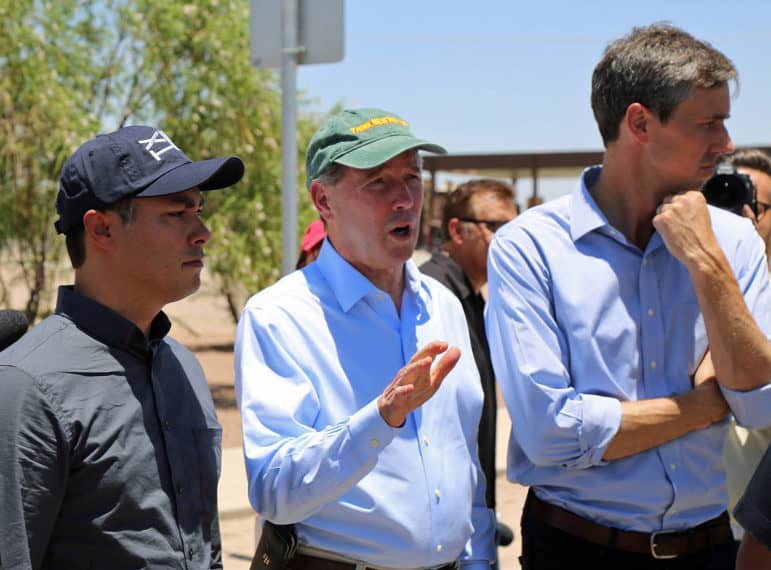
U.S. Sen. Tom Udall's office
U.S. Sen. Tom Udall, D-N.M. (center), joined Democratic U.S. Reps. Joaquin Castro (left) and Beto O’Rourke (right) of Texas on a tour of the tent city at the Tornillo Point of Entry in the borderlands earlier this year.
COMMENTARY: In the Paso del Norte borderland of El Paso, Ciudad Juárez and Doña Ana County, New Mexico, politics knows no borders. For starters, take the 2018 elections. Spending a few days in El Paso, Texas, prior to the Nov. 6 Election Day, I was stunned to see the barrage of television ads dedicated to the Yvette Herrell/Xochitl Torres Small congressional bout and the Michelle Lujan Grisham/Steve Pearce race for governor, both of which were unfolding next door in New Mexico. I wasn’t alone.
“I’ve seen more ads for New Mexico politics than Texas politics,” commented Dr. Irasema Coronado, professor of political science at the University of Texas in El Paso. The longtime border academic was also taken aback by the content and tone of the ads in the New Mexico battles, calling them “vile” and bordering on defamation.
“You’re wondering, if all that was true, why weren’t all these people in jail or indicted?” Coronado pondered. Voters, she contended, are likely alienated by the type of media messaging that marked the 2018 elections in southern New Mexico.
Of course, it isn’t unusual for El Paso print, television and radio enterprises to cover New Mexico politics, as the media outlets beam into the southern slice of the Land of Enchantment.
This year, however, the Herrell-Torres Small competition alone opened up a gold mine for El Paso media. Citing the Center for Responsive Politics, the candidates and “outside groups” involved in the Herrell-Torres Small race spent at least $12.7 million, with final tallies expected next month, according to New Mexico Political Report.
Residents of and visitors to the Paso del Norte have a special vantage point in witnessing international politics as well. I listened to Juárez radio stations while in El Paso and Las Cruces earlier this year to hear about the Mexican election campaigns. Conversely, while recently sitting in a Juárez restaurant I heard a Spanish-language radio ad pop up on the air for Gina Ortiz Jones, the Democratic contender for sprawling, state-sized U.S. Congressional District 23, which actually extends from the eastern edge of El Paso to the western side of San Antonio.
During her campaign, Jones zeroed in on health care and education. She played up her life story of growing up as the child of an immigrant single mother from the Philippines who worked as a domestic. She proudly recounted a military career that included service in Iraq. Endorsed by Emily’s List, she was open about being gay.
“Right now is not the time to be closeted or be ashamed of who you are or who you love,” Jones was quoted by Emily’s List as saying.
After days of nail-biting vote-counting in an election that was decided by a razor-thin margin containing the legal possibility of a recount, Jones conceded on Monday to Republican incumbent Will Hurd, wishing him the best in representing the people of District 23.
“Our campaign was based on the belief that everyone is equal — equally deserving to be heard at the ballot box and served in our communities. While we came up short this time, we ran a race of which we can be proud,” Jones wrote on Twitter.
Though Hurd, an African-American, boasts an almost solidly Republican voting record, he has differed with President Trump on the border wall and is friendly with Beto O’Rourke, the outgoing El Paso congressman.
In 2018, politicians in the Paso del Norte transcended state, national, international and cultural boundaries. O’Rourke may have fallen short in his bid to unseat incumbent Ted Cruz for a coveted Texas Senate seat, but the 46-year-old Paseño’s epic run thrust the Democratic Party back into the competitive rung of Lone Star State politics and may have marked the turning point in the political future of a changing and diverse state.
Now, O’Rourke’s name is being mentioned alongside Elizabeth Warren, Bernie Sanders, Hillary Clinton, Joe Biden, Kamala Harris, Cory Booker and Sherrod Brown as possible Democratic presidential contenders in 2018. On national radio and television networks, talk show host Thom Hartmann opened his lines this past week soliciting listener input on O’Rourke’s possibilities for 2020.
“This guy has a bright future political future, there’s no doubt about it… it’s just amazing what Beto has done,” Hartmann said.
With an audience counted in the millions, and especially popular among the progressive wing of the Democratic Party, Hartmann’s weekday show is one gauge of national political tendencies. His “Brunch with Bernie” segment with the Vermont senator ran as a regular feature for years, introducing a politician from a small New England state to a national audience and creating a bigger stage that allowed Sanders to take on Hillary Clinton for the 2016 Democratic presidential nomination, pushing the parameters of political discussion in this country to the left.
Keep your eyes peeled on the Paso del Norte for 2020. And Like Beto O’Rourke, Gina Ortiz Jones is another personality to watch.
Kent Paterson is an independent journalist who covers issues in the U.S./Mexico border region. Agree with his opinion? Disagree? NMPolitics.net welcomes your views. Learn about submitting your own commentary here.